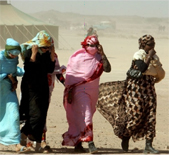 Sometimes, identifying, deciphering and tracking US foreign policy for a particular issue can be exercise in complexity, if not futility. For example, what is the US position on the best way to resolve the Western Sahara conflict, arguably one of the biggest hurdles to progress and stability in North Africa? Well, in an interview last November in the region, US Secretary of State, Hillary Rodham Clinton set the record straight for those who questioned (or were unaware of) US policy on the Western Sahara:
Sometimes, identifying, deciphering and tracking US foreign policy for a particular issue can be exercise in complexity, if not futility. For example, what is the US position on the best way to resolve the Western Sahara conflict, arguably one of the biggest hurdles to progress and stability in North Africa? Well, in an interview last November in the region, US Secretary of State, Hillary Rodham Clinton set the record straight for those who questioned (or were unaware of) US policy on the Western Sahara:
***
QUESTION: Yesterday, Madame Secretary, you reaffirmed that there is no change in the Obama Administration’s position as far as the Moroccan autonomy plan in the Sahara is concerned. Would you like please to elaborate some more?
SECRETARY CLINTON: Well, this is a plan, as you know, that originated in the Clinton Administration. It was reaffirmed in the Bush Administration and it remains the policy of the United States in the Obama Administration. Now, we are supporting the United Nations process because we think that if there can be a peaceful resolution to the difficulties that exist with your neighbors, both to the east and to the south and the west, that is in everyone’s interest.
But because of our long relationship, we are very aware of how challenging the circumstances are. And I don’t want anyone in the region or elsewhere to have any doubt about our policy, which remains the same.
***
So, if US policy is clear, unambiguous and consistent through three Administrations, why has there been so little progress to resolve the three-decades old conflict? Good question.
An answer can be found in an article published in the most recent edition of the MIT International Review authored by Edward M. Gabriel, former US Ambassador to Morocco under Clinton, and Robert M. Holley, his political counselor at the time as well as the US interlocutor with the Polisario Front, an Algerian-backed separatist group calling for Western Sahara independence. The pair trace the history of US policy on the Western Sahara—which is support for autonomy for the disputed territory under Moroccan sovereignty—and outline concrete actions the US can take to move this policy from words to works.
The article is well worth the read because it is rare to get such an inside look at US policy formation and transformation from former US officials who were at the decision-making table. The authors outline practical steps to move towards a solution—such as lifting restrictions placed on existing aid programs which aren’t currently permitted to operate in the disputed territory as well as the ban on travel to the territory by senior US officials. You’ll also learn about key developments concerning the conflict that you may not be aware of—that bipartisan majorities of both the US House and Senate have spoken out strongly expressing explicit support for the US policy of an autonomy/sovereignty solution, for example.
As Sec. Clinton stated, the US is “supporting the United Nations process because we think that if there can be a peaceful resolution […] that is in everyone’s interest.” Very true and Gabriel and Holley’s recommendations align perfectly with that goal. “Supporting” the UN process IS actively pursuing existing US policy, which would be a “win-win” for US interests in the region and the region as a whole.